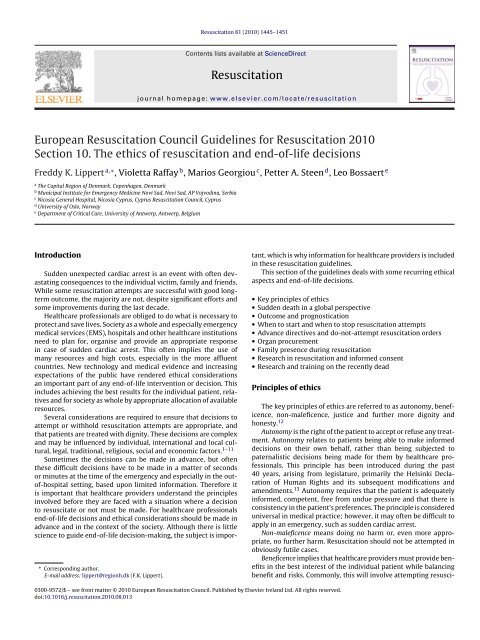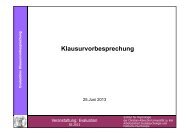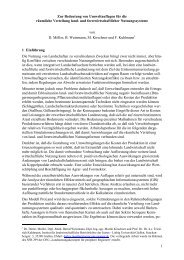European Resuscitation Council Guidelines for Resuscitation 2010 ...
European Resuscitation Council Guidelines for Resuscitation 2010 ...
European Resuscitation Council Guidelines for Resuscitation 2010 ...
You also want an ePaper? Increase the reach of your titles
YUMPU automatically turns print PDFs into web optimized ePapers that Google loves.
<strong>Resuscitation</strong> 81 (<strong>2010</strong>) 1445–1451<br />
Contents lists available at ScienceDirect<br />
<strong>Resuscitation</strong><br />
journal homepage: www.elsevier.com/locate/resuscitation<br />
<strong>European</strong> <strong>Resuscitation</strong> <strong>Council</strong> <strong>Guidelines</strong> <strong>for</strong> <strong>Resuscitation</strong> <strong>2010</strong><br />
Section 10. The ethics of resuscitation and end-of-life decisions<br />
Freddy K. Lippert a,∗ , Violetta Raffay b , Marios Georgiou c , Petter A. Steen d , Leo Bossaert e<br />
a The Capital Region of Denmark, Copenhagen, Denmark<br />
b Municipal Institute <strong>for</strong> Emergency Medicine Novi Sad, Novi Sad, AP Vojvodina, Serbia<br />
c Nicosia General Hospital, Nicosia Cyprus, Cyprus <strong>Resuscitation</strong> <strong>Council</strong>, Cyprus<br />
d University of Oslo, Norway<br />
e Department of Critical Care, University of Antwerp, Antwerp, Belgium<br />
Introduction<br />
Sudden unexpected cardiac arrest is an event with often devastating<br />
consequences to the individual victim, family and friends.<br />
While some resuscitation attempts are successful with good longterm<br />
outcome, the majority are not, despite significant ef<strong>for</strong>ts and<br />
some improvements during the last decade.<br />
Healthcare professionals are obliged to do what is necessary to<br />
protect and save lives. Society as a whole and especially emergency<br />
medical services (EMS), hospitals and other healthcare institutions<br />
need to plan <strong>for</strong>, organise and provide an appropriate response<br />
in case of sudden cardiac arrest. This often implies the use of<br />
many resources and high costs, especially in the more affluent<br />
countries. New technology and medical evidence and increasing<br />
expectations of the public have rendered ethical considerations<br />
an important part of any end-of-life intervention or decision. This<br />
includes achieving the best results <strong>for</strong> the individual patient, relatives<br />
and <strong>for</strong> society as whole by appropriate allocation of available<br />
resources.<br />
Several considerations are required to ensure that decisions to<br />
attempt or withhold resuscitation attempts are appropriate, and<br />
that patients are treated with dignity. These decisions are complex<br />
and may be influenced by individual, international and local cultural,<br />
legal, traditional, religious, social and economic factors. 1–11<br />
Sometimes the decisions can be made in advance, but often<br />
these difficult decisions have to be made in a matter of seconds<br />
or minutes at the time of the emergency and especially in the outof-hospital<br />
setting, based upon limited in<strong>for</strong>mation. There<strong>for</strong>e it<br />
is important that healthcare providers understand the principles<br />
involved be<strong>for</strong>e they are faced with a situation where a decision<br />
to resuscitate or not must be made. For healthcare professionals<br />
end-of-life decisions and ethical considerations should be made in<br />
advance and in the context of the society. Although there is little<br />
science to guide end-of-life decision-making, the subject is impor-<br />
∗ Corresponding author.<br />
E-mail address: lippert@regionh.dk (F.K. Lippert).<br />
tant, which is why in<strong>for</strong>mation <strong>for</strong> healthcare providers is included<br />
in these resuscitation guidelines.<br />
This section of the guidelines deals with some recurring ethical<br />
aspects and end-of-life decisions.<br />
• Key principles of ethics<br />
• Sudden death in a global perspective<br />
• Outcome and prognostication<br />
• When to start and when to stop resuscitation attempts<br />
• Advance directives and do-not-attempt resuscitation orders<br />
• Organ procurement<br />
• Family presence during resuscitation<br />
• Research in resuscitation and in<strong>for</strong>med consent<br />
• Research and training on the recently dead<br />
Principles of ethics<br />
The key principles of ethics are referred to as autonomy, beneficence,<br />
non-maleficence, justice and further more dignity and<br />
honesty. 12<br />
Autonomy is the right of the patient to accept or refuse any treatment.<br />
Autonomy relates to patients being able to make in<strong>for</strong>med<br />
decisions on their own behalf, rather than being subjected to<br />
paternalistic decisions being made <strong>for</strong> them by healthcare professionals.<br />
This principle has been introduced during the past<br />
40 years, arising from legislature, primarily the Helsinki Declaration<br />
of Human Rights and its subsequent modifications and<br />
amendments. 13 Autonomy requires that the patient is adequately<br />
in<strong>for</strong>med, competent, free from undue pressure and that there is<br />
consistency in the patient’s preferences. The principle is considered<br />
universal in medical practice; however, it may often be difficult to<br />
apply in an emergency, such as sudden cardiac arrest.<br />
Non-maleficence means doing no harm or, even more appropriate,<br />
no further harm. <strong>Resuscitation</strong> should not be attempted in<br />
obviously futile cases.<br />
Beneficence implies that healthcare providers must provide benefits<br />
in the best interest of the individual patient while balancing<br />
benefit and risks. Commonly, this will involve attempting resusci-<br />
0300-9572/$ – see front matter © <strong>2010</strong> <strong>European</strong> <strong>Resuscitation</strong> <strong>Council</strong>. Published by Elsevier Ireland Ltd. All rights reserved.<br />
doi:10.1016/j.resuscitation.<strong>2010</strong>.08.013
















